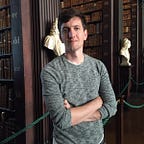Great social reformer or a great disappointment?
Last week the FT decided to set a theoretical history exam paper from 2066 to try and explain the tumultuous political events of the last few months (http://on.ft.com/2bOplXy). It doesn’t make for very happy reading. I thought I’d try and turn that around a write a slightly more optimistic take on the only question that I knew anything about.
“A great social reformer or a great disappointment? Which is the fairer verdict on the presidency of Mr Obama?”
Few, if any, modern day presidents have approached the front gates of the White House with a greater set of expectations foisted upon them than Barak Hussain Obama. For the two million people who lined Pennsylvania Avenue on that cold January in 2009 his elevation seemed rapid, remarkably unlikely and joyously hopefully. His coalition of supporters invested him with an almost messianic status. A leading British magazine of the day, The Economist, not known for its predilection for melodrama, ran a front page that simply stated “It’s Time”
In this context it was impossible for the prose of eight years of governing to have not be a little disappointing for those who had been so enraptured by the poetry of his campaign. And what poetry it was! Mr. Obama came to office at a time when the “First Online Generation” was in its political infancy. Never before had they had the chance to witnesses such a gifted orator, endlessly shared and repeated on the then new social media networks, who could encapsulate their hopes, dreams and aspirations through in a single resonating phrase. His promises of hope, the “audacity of hope”, reverberated around the world. He stood in dignified contrast to the macho belligerence of his predecessors or the fear-mongering of many of his subsequent challengers.
It was of course a difficult age for America and much of what was then described as the “developed world”. Mr. Obama’s presidency began under the cloud of the Great Recession and continued through the shadow of a bifurcating political discourse across many liberal democracies. His oft repeated plea for a truly united United States broke violently on the rocks of a intransient Republican party determined to derail the signature projects of their opponent. He was derided as the philosopher-in-chief but found no peace between the divided houses of Washington.
This division was the source of many of his greatest disappointments. He didn’t successfully close the torture camp on Guantanamo Bay that had blighted the moral authority of his predecessor. He was unable to curb his nation’s early century obsession with deadly weapons. Perhaps most damagingly of all he struggled to improve the lot of those who had entered the “land of the free” and found themselves living in fear of either exploitation or deportation.
These disappointments where painfully felt, and vociferously argued, at the time. He was criticised by the Right and the Left for doing too much or too little at every turn. His critics railed either against his “socialist” agenda or the fact that he failed to express the fact that #blacklivesmatter.
However, as is so often the case, the short-termism of the media cycle failed to recognise quite how substantially President Obama shifted the social fabric. Things that we take for granted were hard fought privileges of that reformist age. He achieved a universality in access to healthcare that was unimaginable to previous generations and finally broke a benighted reliance on the vagaries of market-based solutions. He showed the world that not asking and not telling couldn’t work and that love is love no matter form it takes. He also realised, with remarkable foresight, that the most pressing social reforms were those with consequences that had only just started to be felt. His leadership on creating the first genuinely global climate agreement felt incremental at the time but proved instrumental to the complex web of checks and balance that we’ve since put in place. He went a long way to protect our fragile world from the ravages of its erstwhile reckless carbon addiction. His willingness, in the face of much domestic opposition, to build bridges of Rouhani’s Iran was clearly instrumental in spurring the enlightened revival of that great nation and finally provided the ballast that the Islamic Middle East of 50 years ago so desperately lacked.
But perhaps above all his now lauded status because his calm, persistence vision for a more socially equitable settlement caused those who opposed him into a state of existential crisis. We can be eternally grateful to the voters of 50 years ago that they had the foresight to reject the demagoguery of neo-facist of Donald Trump and forced the party of Lincoln and Eisenhower to radically reconstitute itself.
As is often the case, history has been kind to Mr Obama. Looking it back through the gallery of presidents it is impossible to miss the most of obviously fact of all — the jolting break that the 44th version represented in a long chain of monotone monotony. Without his ascendance, a skinny kid with the funny name from a heady mix of Kansas and Kenya, who knows how long it might have taken to break the stranglehold that old white men had on what was then the world’s most powerful desk. His social legacy has been secured by the inclusive, diverse set of individuals who followed him into that office — none more so that the firebrand 46th president whose transformations went so far in crafting the global social system that we operating in today. A certain Mrs. Obama…
